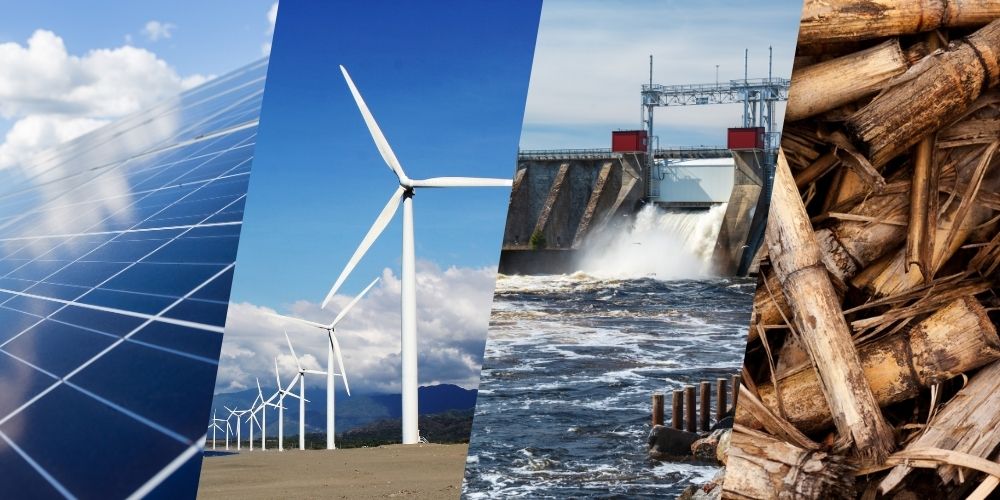A Brief Summary Report | December 2023
Introduction
Electricity generation from clean energy technology is becoming more & more popular around the world, both in the household and industrial sector. The production of such electricity not only promotes grid sustainability but it also supports corporations that need to use clean energy. This can be purchased through Renewable Energy Certificates (RECs) to compensate for greenhouse gas emissions from electricity use or to reduce Scope 2 carbon footprint.
What is REC? (Renewable Energy Certificates)
Key Questions

What kind of technology are RECs produced from?

Which technology should you choose for your company’s goals?

What are the differences between purchasing RECs produced from different technologies?
1. What kind of technology are RECs produced from?
In 2023 , the technologies that are accepted in electricity production required for purchasing Renewable Energy Production Certificate (REC) in Thailand are:
Solar
Wind
hydropower
biomass

If you choose to purchase Renewable Energy Certificates certified by I-REC, you can be sure that there is no double counting, and all technologies can be used to claim the use of renewable energy.

2. Which technology should you choose for your company’s goals?
If your organization or trading partners are members of RE100, prefer best practice technologies and express a desire to purchase RECs:
GMS Solar recommends choosing to purchase RECs generated from solar and wind energy technologies as these technologies have been directly endorsed by the RE100 association.
If you are an organization that is starting to do a sustainability report & want the most cost-eective REC:
GMS Solar recommends considering the purchase of RECs generated from hydropower & biomass energy technologies. These options often present the most aordable REC prices while still contributing to your clean energy objectives.
3. What are the dierences between purchasing RECs produced from different technologies?
Factor
REC Energy Type
Solar
Wind
Hydropower
Biomass
Verified by I-REC , Issued by E-GAT (Electricity Generating
Authority of Thailand)
Claiming the right to
use clean energy
Accepted by
the RE100 Association
*
*
Most cost-effective
Remark
*The RE100 Association solely accepts cases of “Sustainable Hydropower” or “Sustainable Biomass”
Knowing the Differences Between Each Technology
- Solar Energy Technology
- Easy & simple implementation, requiring only area with adequate sunlight
- Relatively clean energy obtained & lowest environmental impact
- Preferred choice for organizations interested in both installation & RECs purchasing
- Requires relatively high upfront capital investment for installation & limited by daylight hours
- Fluctuating supply which leads to higher per unit price compared to RECs from other technologies
- Wind Energy Technology
- Generates relatively clean electricity by harnessing natural wind
- Gives minimal impact to the environment & does not produce any combustion gasses
- Cost-competitive with Solar Energy
- Careful site selection of installation areas is crucial to avoid adverse effects on living beings & the environment
- Strategic planning & implementation is necessary to minimize investment risk due to large-scale nature of projects
- Hydropower Energy Technology
- Leverages existing dams or rivers, utilizing the principle of gravity to generate electricity
- Only requires an area that minimally impacts living beings
- The pioneering method for producing electricity with clean energy, widely accepted & adopted globally
- Can generate a substantial amount of electricity, making the REC obtained highly cost-effective
- Biomass Energy Technology
- Optimal resource utilization, providing a cost-effective solution
- Repurposes waste from diverse sectors such as agriculture & livestock farming to create value before eventual disposal in landfills
- Clean, affordable & plays a significant role in supporting communities through purchasing leftovers from industries, generating income for community members & discouraging improper practices of burning of plant remains
- Requires relatively high temperatures for decomposition, resulting in the various gasses as by-products of combustion
Summary
Renewable Energy Certificates (RECs) acquired from Solar, Wind, Hydropower & Biomass Energy Technologies can be utilized to assert the right to use clean energy. The choice of purchase depends on the specific objectives & goals of each organization.
In light of these trends, our company recommends diversifying the purchase of RECs from various energy sources in your portfolio to support a balanced and sustainable electricity project for your company. If your organization is committed to utilizing clean energy, GMS Solar is delighted to offer guidance on the purchase of RECs, whether to offset greenhouse gas emissions from electricity use or to reduce Scope 2 Carbon Footprint, contributing to the overall sustainability of your organization
PDF Download







